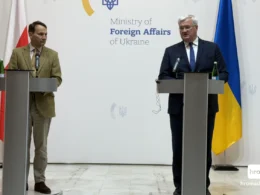On 6 November, dozens of Polish truck drivers blocked three border crossings with Ukraine to push back against increased competition from Ukrainian carriers after the liberalization of laws governing international transport between Ukraine and the EU, RFM24 reported.
Polish heavy trucks parked on roads and disrupted traffic at the Hrebenne, Dorohusk, and Korczowa checkpoints.
Ukraine's State Border Guard Service reported that cargo traffic towards the Yahodyn-Dorohusk, Krakivets-Korchova, and Rava-Ruska-Hrebenne crossings is now severely disrupted, impacting both entry into Poland and exit from Ukraine.
According to protest organizers, only one truck per hour will be allowed to pass, along with vehicles carrying security and humanitarian cargo, animal transport, and perishable goods.
Polish trucking companies have argued for months that Ukraine's special temporary access to EU roads, granted after Russia's full-scale invasion, is undercutting their business. On 3 November, Polish truck drivers threatened to shut down all border crossings between Poland and Ukraine held a large-scale protest
“Today, it's hard to even talk about Polish transportation to and from Ukraine, as we have completely lost this market to Ukrainian carriers, who have significantly increased the number of transports since the beginning of the Russian invasion of the country,” President of the Association of Employers in Transport and Logistics Poland Maciej Wronski told RFM24.
Polish carriers demand that Ukraine reintroduce permits for transportation that were canceled under the transport visa-free regime. The agreement on road freight transport signed in June 2022 eliminated the need for Ukrainian carriers to obtain permits for bilateral and transit transportation to EU states.
After the signing of the agreement, the number of carriers crossing the border towards the EU increased by 53% in the first year, and the number of crossings increased by 43%.
“Of course, the Ukrainian market was never significant for our entire industry. But on the other hand, it provided work for carriers from the Lubelskie and Podkarpackie provinces, who specialized in transport to the east. Today, they are going bankrupt, especially since, given the recession across the whole market, they won't find work elsewhere,” Maciej Wroński emphasized.
Read also:
- Tide turns in Warsaw: what Poland’s poll upset means for Ukraine
- Poland to stop aid for Ukrainian refugees in 2024, official says
- Ukraine receives first set of repaired Leopard tanks from Poland
- Grain dispute: how Poland and Ukraine can reach a solution





